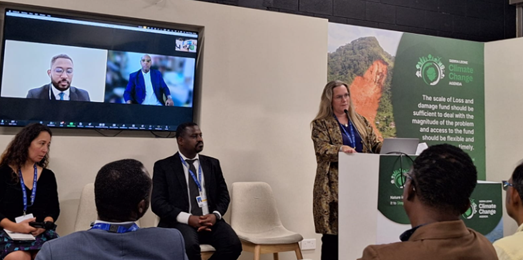There are links between two major global crises: climate change is contributing to worsening rates of antimicrobial resistance. Jillian Sprenger discusses the need for increased global collaboration on both political and scientific levels to address these issues.

In the months following COP26, there is heightened awareness of what the climate crisis has in store for humanity: images of fire, flood, displacement, and devastation are vivid in everyone’s minds. However, a parallel crisis is unfolding at the same time, and though it is discussed in certain policy circles, it has yet to truly invade the public consciousness.
Antimicrobial resistance (AMR) is a problem of a scale almost matching that of the climate crisis. Driven largely by the overuse and misuse of antimicrobials, infectious pathogens such as bacteria, viruses, and fungi can over time become resistant to the medications used to treat them. At the global scale, certain antimicrobials are now becoming ineffective and infections more difficult to treat. It is hard to overstate the seriousness of this. Without effective antimicrobials, modern medicine is at risk: cancer chemotherapy, certain routine examinations, and minor and major surgeries are dependent on antimicrobials to prevent infection. In addition, previously treatable illnesses such as pneumonia, tuberculosis, and even minor wound infections are becoming increasingly difficult to address.
The World Health Organization has identified AMR (alongside climate change) as one of the top global health threats facing humanity. Certain countries are taking this seriously: the finance ministers of G7 countries recently released an official statement on Actions to Support Antibiotic Development. As early as 2014, the UK had also commissioned the Review on Antimicrobial Resistance to study its economic and social aspects. Though the issue has been known to governments and public health experts for quite some time, it still has limited public salience.
While AMR is clearly an existential threat, only recently are its direct links to the climate crisis becoming clear. AMR does not exist in isolation: it is in fact worsened by the effects of climate change. As the planet warms, the biological processes that underpin bacterial evolution accelerate. This allows bacteria to divide and reproduce more quickly. In the simplest terms, the production of more bacteria leads to a higher chance of developing resistance. Unfortunately, the impact of climate change on AMR goes even further than this. Disaster-related population displacement (such as that experienced as a result of severe flooding or drought) can lead to conditions of overcrowding and poor sanitation, which is also known to increase infection rates and therefore antimicrobial resistance. As the climate crisis worsens, so too will AMR.
Moreover, some of the fundamental causes of climate change are also drivers of AMR. This is particularly clear when considering industrial agriculture. While contributing immensely to greenhouse gas emissions, large-scale livestock farming also contributes to AMR due to the rampant and irresponsible use of antibiotics that is all too common in commercial agricultural practice.
It is evident that the climate crisis and the AMR crisis are inextricably linked. What is even clearer, however, is that both will require the same type of response. Fundamentally, these crises are collective action problems, and addressing them is only possible through global coordination and collaboration. Certain states have made great progress in addressing AMR through a combination of strong political will, smart policymaking, and innovative technology. Taiwan is a leader in this regard: policymakers and experts have collaborated to design a multifaceted suite of interventions, including a prescription audit system for general practitioners, a social media patient education campaign, and a program to increase the use of hospital-based bacterial susceptibility data. The world must learn lessons from such success cases, both in the context of AMR and in that of climate change.
Of course, working to address either AMR or climate change is an enormous challenge, especially in resource-limited settings. The realities of life (particularly in the context of developing countries) do not necessarily permit easy implementation of interventions, and it would be unethical to try to enforce certain policy measures on individuals who are struggling to get by in their day-to-day lives.
So, where does this leave us? We must focus on the fundamental idea that global collaboration is necessary when attempting to address these seemingly intractable problems. To facilitate this, we need cooperation across both scientific and political domains to better understand and address issues of this scale. Scientists and innovators must share their findings more widely and with less emphasis on the protection of intellectual property: this is necessary whether we are considering, for example, the development of new antimicrobials or the creation of novel clean energy technologies. On the policymaking front, leaders of wealthy countries must learn best practices from states that have implemented successful policies addressing these issues, then must commit to applying those lessons domestically. These developed countries then have a responsibility to use the enormous wealth at their disposal to support lower-income nations in doing the same. The UK has been a leader in this domain, having established the Global AMR Innovation Fund, which funds projects seeking to reduce the threat of AMR in low- and middle-income countries. This type of action is critical: no global problem can be successfully addressed without truly collaborative solutions.
The stakes for these crises are almost unfathomably great, but now is the perfect opportunity to make change. As the world focuses increasingly on how best to address the climate crisis, we should be taking a holistic perspective that incorporates issues such as AMR, issues that are directly linked to climate change. Though important steps are being taken to address both climate change and AMR, more concerted action is needed now. In this brief window we can act to ensure that these major global problems are addressed in a sustainable and equitable manner.
The views and opinions expressed in this post are those of the author(s) and not necessarily those of the Bennett Institute for Public Policy.






